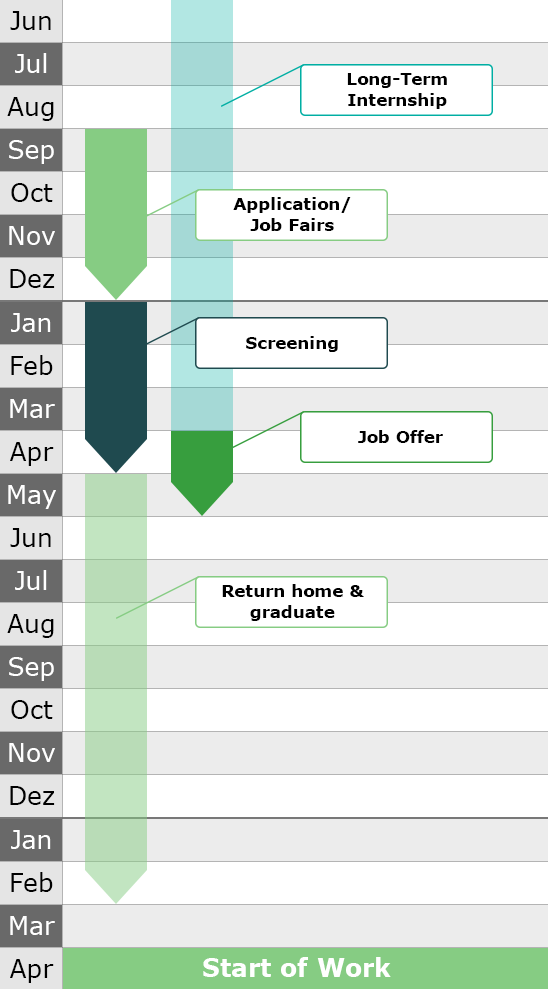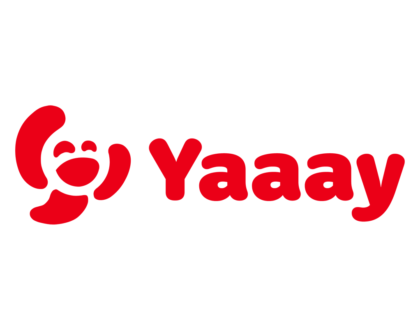How to Job Hunt in Japan as a Foreigner

by Madelaine
You want to get a job in Japan, but can’t start looking one year in advance, like Japanese university students? This article introduces some alternative timelines for job hunting in Japan as a foreigner. At the end of the article, you can also find links to free video resources for job-hunt preparation. To jump right to them, click here.
Some general advice before jumping into the details:
- ✔ Prepare before coming to Japan
- ✔ Time your trip to match job events and interviews (avoid January-February)
- ✔ Aim to finish your job hunt at least 3 months before the start of your job (most likely in April)
コンテンツ
Method 1: Follow the Traditional Schedule
If you’re staying in Japan long-time, you can join the regular hiring season that kicks off in March every year. To successfully complete this “traditional route”, you should be available for tests and interviews until July/August when most companies wrap up their main hiring activities for new recruits. Since this article is aimed at people who can’t follow this traditional schedule, I won’t go into further detail here. If you’re interested, you can check out the article linked below for more info.
READ ONThe traditional Japanese hiring season
Method 2: The Off-Season Job Hunt
It’s perfectly possible to find a job even if you can’t start your job search in March. More and more companies in Japan are shifting to year-round recruitment, so there more than enough opportunities for “off-season” job seekers.
If the circumstances allow it, come to Japan for your job hunt. Coming to Japan shows commitment and companies will be able to get a clear impression of you (and you of them)! For Japanese companies, personality is an especially important factor when hiring new staff (you might not be asked for your grades or transcripts at all), so meeting in person will definitely pay off. Once you get to talk with people directly, arranging the recruitment process to your personal schedule becomes much easier.
Step 1: Prepare for your Job Hunt
Ideally, you should start your preparations about 6 months before coming to Japan. To meet expectations of Japanese HR staff, you should cover the same steps as Japanese students do. Here’s a list of things you want to go through:
■ Self-analysis
Take an honest and critical look at yourself and think about your personality, skills, values, career goals, and reasons for choosing Japan. Moving to a foreign country for work is not an easy task – and you don’t want to end up disillusioned, with a job that you don’t enjoy. So don’t take this step too lightly! Find more about self-analysis here.
■ Business field research
After sorting out the basics, think about the industry you would like to work in. If you’re not yet familiar with it, collect all sorts of information – not only about the industry in general but also about things specific to Japan.
■ Job research
Next, think about the kind of job that suits you (using your strengths as a jump-off point). Learn more about the jobs you are considering by reading job descriptions, reports of people working in the particular position, and their careers.
■ Company research
Once you’re done with narrowing down industries and job types, you can start looking for companies. Things you’ll want to keep in mind are differences in business etiquette, industry standards, and working environment.
■ Test preparation
In addition to job interviews, Japanese companies make use of a wide variety of tests. It might be difficult to get specific study materials before coming to Japan. Most tests cover the following three categories:
1) General-purpose aptitude tests, checking things like Japanese knowledge and middle school math
2) Personality tests
3) Tests for specific skills (heavily depends on the company and the job type: programming tests, typing tests, etc.)
■ Writing a Japanese CV
You should have an English and a Japanese version on paper and online. If you haven’t filled out a Japanese CV before, check out our guide.
■ Interview preparation
Think about what you noticed during self-analysis, business field, and company research. You can find a list of the most common Japanese interview questions over here.
■ Get an overview of job-hunting options
Have a look at job-hunting websites, career fairs, company websites, etc. to get an idea of what to look for and how to search. If possible, try to establish contact with specific companies early on.
Prepare what you can before coming to Japan, especially when you are on a tight schedule. That way, you don’t lose precious time in Japan.
Step 2: Get the right Visa
When job-hunting, think about coupling your job search with a Japanese language school course, working holiday, or an internship. All of these options give you access to a visa that’s valid for longer than the 3-month tourist visa.
The perks of having a mid- to long-term visa:
- ■ As companies might be wary about hiring tourists, a stable legal status will help your case (official address, Japanese ID etc).
- ■ You can get a Japanese phone. Japanese recruiters love calling directly, and events like career fairs often require a Japanese phone number.
- ■ You can earn some money to keep yourself afloat.
- ■ You can get an idea of what everyday life in Japan is really like.
- ■ Those extra Japanese classes might make the difference between passing that next JLPT level or wooing the HR guy at your next interview.
If the above options are not possible for you, you can also come to Japan on a tourist visa. Keep in mind that a tourist status limits your access to Japanese services, which might complicate your job search.
Step 3: Time your Visit
Around 70% of companies follow the typical Japanese hiring flow (March ~ October). But smaller companies, multinationals, and startups are recruiting year-round and you can approach them at any time. To further increase your chances, do some research from home so you can time your stay according to events like job fairs. In addition to the job fairs at the start of the job hunt season (March) and later on in fall (September/October), there are also fairs specifically aimed at foreigners in Summer (June) and Winter (November ~ December).
While it is possible to get job offers on the spot at events, you should set aside around 2-3 months dedicated to job-hunting. This allows you to prevent cases like your visa expiring days before an interview opportunity.
Depending on your personal schedule, an off-season job hunt in Japan could look something like this:
In the example above, you’d look for a long-term internship starting in summer or fall and job-hunt on the side. Keep in mind to send in your last few applications before Christmas, squeeze in some final 説明会 (company seminar) spots in January and hopefully walk away with a job offer (内定) in early spring, just before you return home. You then spend the rest of the year finishing up your university work and start working in Japan in the following spring.
If you’ve already graduated, it’s also possible to start working a bit earlier (without having to wait one year). However, in that scenario, you won’t be able to do a full-time, paid internship – those require you to be a student. So you’ll have to find another route. For more info, check our visa guide for internships.
Step 4: Start your Job Hunt!
Apply to companies you are interested in directly via their websites, search for companies and jobs online, or sign up for career fairs. Sign up and go to seminars, events, and interviews!
At this stage there are two mistakes to avoid at all cost.
First, don’t go to your dream company for your first interview.
Testing yourself with companies you are less interested in will allow you to practice and improve before your big chance with your dream company.
Second, don’t overestimate your chances when you have a few interviews lined up.
Japanese companies might invite every applicant for a first interview, as long as there were no blatant mistakes in the application.
Opinions on Japanese Career Fairs among foreigners vary. Some think they’re great opportunities, others think they’re inefficient. With 説明会 by the hour and walk-in interviews, they are designed to get as many people as possible involved. This can be a great chance for you to present yourself, and get a feel for the companies you are interested in!
It also means that there will be waiting times until your time slot is up. If you’re taking time out of your schedule to go to the venue anyway, use that “between time” to make a friend or brush up your CV based on the new input you got.
Method 3: Job-hunt from Abroad
You can’t simply leave everything and hop on a plane to Japan to look for a job? Thanks to modern technology, applying from your home country is possible, although there will be fewer options to choose from. Highly specialized job boards like tokyodev or japandev sometimes list positions that don’t require the applicant to be in Japan. You can also try out general-purpose boards like gaijinpot or Daijob and filter for your requirements.
Apply from home and inquire about Skype interviews. Keep the Japanese hiring cycle in mind when applying, and schedule accordingly. Also, look for Japan-related career fairs in your area. CFN career forums have been held in places like Boston, Los Angeles, London, and Shanghai as well as online. If you’re lucky, you might be able to snatch a job right there on the spot.
Get started with these free resources
No matter what route you choose for your job hunt, one thing is clear: You’ll be interacting with Japanese people, in Japanese. Even when you’re aiming for a job at a multinational company, it’s good to have a solid grasp of Japanese job-hunting etiquette. This is something that you can learn about even before coming to Japan!
Below, you can find links to a video seminar series provided by Yokohama National University, as part of the Yokohama-Kanagawa International Student Support Program. These videos give you a quick and easy-to-understand rundown of all the things we didn’t go into detail about in this article: From how to bow correctly to writing your Japanese CV and business-style e-mails. The videos are in Japanese with English subtitles.
*These video seminars are free to access for international university students. If you’re not studying at one of the Japanese universities in the dropdown menu, choose その他 (“Other”) and write your university name in the second “affiliation” field.
Free Video Seminar Series for International Students
Provided by: Yokohama National University/Yokohama City University
Lecturer: Okada-sensei (Linguage Japanese Language School)
Seminar 1) Job Interview Etiquette
[CLICK HERE]
Duration: ~15 minutes
Contents:
– Leaving a good first impression
– Elegant bow
– Etiquette for company visits
– Things to keep in mind during online interviews
Seminar 2) Writing an Entry Sheet, Part 1 – Self-Promotion
[CLICK HERE]
Duration: ~10 minutes
Contents:
– Difference between an entry sheet and a resume
– What to consider when writing an ES
– Difference between self-promotion and self-introduction
– Self-promotion structure
– Common expressions for self-promotion
– How to write a self-promotion in Japanese
Seminar 3) Writing an Entry Sheet, Part 2 – Motivation for Application
[CLICK HERE]
Duration: ~17 minutes
Contents:
– How to express your motivation for application in Japanese
– How to write about your achievements at university
Seminar 4) E-Mails and Phone Calls
[CLICK HERE]
Duration: ~14 minutes
Contents:
– Basic etiquette
– Common conversation / email patterns and templates
– Polite written expressions
– Polite spoken expressions
Recommended Posts

The 10 Most Popular Japanese Companies in 2021
19 5月 2021 - Work



